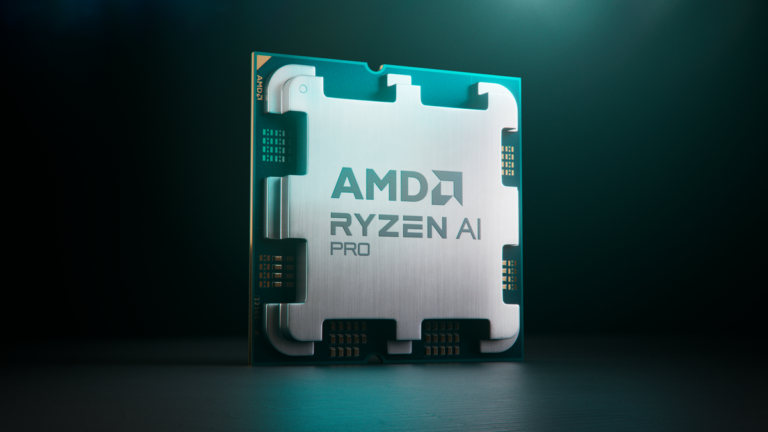The Ryzen AI 9 HX 370 12-core mobile processor has been spotted in another leaked benchmark, paired with a new Ryzen 7 part dubbed the Ryzen AI 7 Pro 360. As reported by IT Home, both processors were spotted in the CrossMark benchmark, where the Ryzen 9 AI HX 370 outperformed the outgoing Intel Core Ultra 9 185H. However, the Ryzen AI 7 Pro 360 showed disappointing results, being beaten by a two-generation Ryzen 9 7940HS with the same core count.
Technically, we’ve already talked about the Ryzen AI 7 Pro 360, but in our previous article, it was known as the Ryzen AI 7 Pro 160. If you don’t know yet, the 100-series nomenclature was originally supposed to be the name of AMD’s first-generation Ryzen AI lineup, but AMD changed the numbering scheme from 100 to 300 at the last minute. As a result, the Ryzen AI 7 Pro 160 and the Ryzen AI 7 Pro 360 share the same chip.
We now have two confirmations that the Ryzen AI 7 Pro 360 is an 8-core Zen 5 processor, featuring two core clusters with an odd number of cores. One cluster has three regular Zen 5 cores, while the other has five smaller Zen 5c cores. The 8-core configuration is backed by just 8MB of L3 cache and 8MB of L2 cache (supposedly), and a Radeon 870M GPU, which is suspected to come with 8 CUs (half the core count of the Radeon 890M).
The published PassMark benchmark results compared four processors: the Ryzen AI 9 HX 370, the Ryzen AI 7 Pro 360, the Core Ultra 9 185H, and the Ryzen 9 7940HS (erroneously labeled as a Ryzen 7 SKU in the image).
The Ryzen AI 9 HX 370 achieved an overall score of 1,713 points, including 1,549 points in the productivity segment, 2,128 points in the creativity segment, and 1,212 points in the responsiveness segment.
The fastest processor in the group is the Meteor Lake-based Core Ultra 9 185H, which has 16 cores and 22 threads. The Intel chip scored 1,693 points overall, 1,549 points in the productivity segment, 1,981 points in the creativity segment, and 1,391 points in the responsiveness segment.
The third fastest chip was AMD’s previous generation Ryzen 9 7940HS, which features eight Zen 4 cores. Overall, the chip scored 1,623 points, with 1,561 points in the productivity segment of the CrossMark benchmark, 1,792 points in the creativity segment, and 1,369 points in the responsiveness segment.
The Ryzen AI 7 Pro 360 is at the back of the pack, the slowest of the four processors in this benchmark. The Zen 5 mobile processor scored 1,373 points overall, 1,267 points in productivity, 1,639 points in creativity, and 1,023 points in responsiveness.
| Processors | Overall score | Productivity score | Creativity score | Responsiveness score |
|---|---|---|---|---|
| Ryzen AI 9 HX 370 | 1,713 | 1,549 | 2 128 | 1,212 |
| Core Ultra 9 185H | 1,693 | 1,549 | nineteen eighty one | 1,391 |
| Ryzen 9 7940HS | 1,623 | 1,561 | 1,792 | 1,369 |
| Ryzen AI 7 Pro 360 | 1,373 | 1,267 | 1,639 | 1,023 |
The Ryzen AI 9 HX 370’s results are no surprise. The chip outperformed all other processors in terms of performance thanks to its twelve Zen 5/Zen 5c cores. Intel’s Meteor Lake Core Ultra 9 185H, despite its higher core count, should now be considered a previous-generation product. Intel is preparing to release its Ryzen AI 300 series competitor, Lunar Lake, later this year, hoping to close the gap with AMD and its faster Zen 5 architecture.
The Ryzen AI 7 Pro 360’s results are more surprising. Previously, we saw the chip outperform the Ryzen 9 8945HS (a newer variant of the 7940HS) in Geekbench. The story is much different here, with the Zen 5 chip in the pro series being noticeably less capable than the Ryzen 9 7940HS. The 7940HS is 18% faster than the Ryzen AI 7 Pro 360 in the overall benchmark score.
This shows that we can’t take these results too seriously; the Ryzen AI Pro 360 in this test could potentially be an engineering sample with much lower clocks than its future production counterpart. The performance results aren’t surprising, given that the Pro 360 has half the L3 cache capacity of the Ryzen 7 9740HS. If CrossMark is an L3-sensitive benchmark, that would explain the performance deficit.


